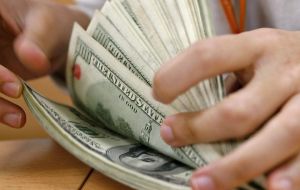MercoPress. South Atlantic News Agency
Chavez devalues Bolivar, establishes dual exchange rate
 A more expensive US dollar will help cut imports and cover the budget deficit
A more expensive US dollar will help cut imports and cover the budget deficit Venezuela devalued on Friday the official exchange rate of the Bolivar currency for the first time since March 2005, and created a second exchange rate for non-essential imports, to stimulate exports and close a fiscal deficit.
President Hugo Chavez said that the Bolivar would be devalued to 2.60 per US dollar from 2.15 per US dollar and a second exchange rate, known as the “oil dollar,” will be pegged at 4.3 per US dollar for non-essential imports. The unregulated currency market will be “intervened” in by the central bank to control the rate, he said.
“This is to boost the productive economy, to reduce imports that aren’t strictly necessary and to stimulate exports” Chavez said in comments on state television. “We need to stop being a country that only exports oil.”
Chavez said that imports of health related products, food, machinery, books, technological instruments, public sector purchases and remittances will be subject to the 2.60 Bolivares to the US dollar rate.
However items such as cars, telecommunications, tobacco and beverage, chemical, petrochemical or electronic gear will have to pay the US dollar, 4.30 Bolivares.
The government will receive more Bolivares per dollar from oil exports through the devaluation while trying to keep a lid on inflation that closed the year at almost 27%, among the highest annual rates of the world.
Venezuela, the largest oil producer in South America and a founding member of the Organization of Petroleum Exporting Countries, fell into recession in 2009, its first in six years, after oil revenue, oil production and manufacturing plunged.
The government, which restricted foreign currency trading in January 2003 following a two-month general strike intended to oust Chavez from power, last devalued the currency about 11% in March 2005. The Bolivar was also devalued in 2004
Analysts say Venezuela's stagflation, soaring prices despite a slump in economic activity, spells a difficult 2010 for President Hugo Chavez's government with a legislative elections looming in September.
The government is expected to spend heavily ahead of the vote to combat an opposition push to slash or overturn the socialist leader's control of the National Assembly.
Venezuela's 2009 inflation was lower than the 2008 figure of 30.9% and the monthly rate eased to 1.7% in December, down from 1.9% in November, according to a Central bank release. December rate was the lowest since March 2009 and down from 2.6% in December of 2008.
Goods and services led the rises at 3.2% in December, while food and drinks were up 1.6%. Education services had the smallest rise, at 0.2%.




Top Comments
Disclaimer & comment rules-

-

-

Read all commentsthis is not remedy !!
Jan 09th, 2010 - 04:57 pm 0if you have a Economy which exports - petrol - plus some other productions like ..Venezuela...Mexico..
then you must have different type deviced Economy ..!!
these are not as same as-- petrolic Arab -- countries
who they can not even grow parsley !!!!
More evidence of the failed socialist theories of the 19th century..
Jan 10th, 2010 - 12:43 pm 0Venezuela's - quota- at IMF !!
Jan 11th, 2010 - 02:48 am 08.070.792 miles de Bolivares !!
Commenting for this story is now closed.
If you have a Facebook account, become a fan and comment on our Facebook Page!